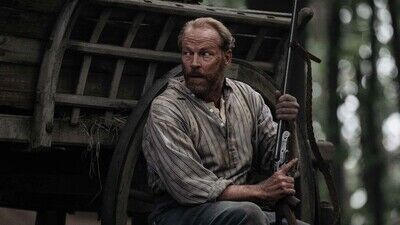The two main characters are Leonard Lambert (Iain Glen)—a soft-spoken widower who lives on a farm with his daughter Johanna (Emma Dupont) and his son Adrien (James Downie)—and a German army officer, Lt. Laurentz (Joe Anderson). On top of his obvious psychological problems (including psychosis, a hair-trigger temper, and alcoholism), Laurentz is a world-class scumbag villain, the kind you spend an entire movie rooting for somebody to murder as gruesomely as possible.
This is not a shades-of-grey kind of movie. Nor is it one where the characters have more than two dimensions or the hint of a personal life beyond their immediate plot function. Lambert is, it appears, a committed pacifist who would rather avoid confrontation than participate in it (his last name begins with “Lamb” after all). At the same time, Laurentz is so detestable and chaotic that his superior officer and actual dad, Commander Maximilian (Philippe Brenninkmeyer), calls him a monster and briefly ends up having the lad’s pistol pointed at his forehead. The rest of the characters—including Adrien’s girlfriend Louise (Sasha Luss) and her father, Dr. Janssen (Koen De Bouw), and the parish priest Father Michael (David Calder)—are mainly there to create suspense as to whether they’ll be tormented or murdered by Laurentz, whose solution to every problem is to reach for his gun. (Gotta hand it to the guy: he’s not big on delegating. He personally kills so many people in this movie that you start to wonder why he brought those other folks with him.)
The violence is circumscribed, usually showing you just enough gore and/or pain to get across the idea that war is indeed hell (though the goopy sound effects and screams fill in the blanks as far as horrors-of-war). But the more “The Last Front” seems to want to speak seriously to the inhumanity of wartime, the less I was inclined to trust it because it traffics in the visual and aural language of the red-meat revenge thriller. At many points, connoisseurs of action cinema may be reminded of films starring and/or directed by Mel Gibson, such as “The Patriot,” “Braveheart,” and “Hacksaw Ridge” that genuflect toward some kind of larger statement about a certain historical period but end up being functionally indistinguishable from a 1980s Arnold Schwarzenegger or Sylvester Stallone picture where one man can become an army.
Considering that other villagers almost immediately start suggesting that Lambert is the perfect guy to lead a rebellion against the Germans—plus the fact that Glen is best known for spending eight seasons on “Game of Thrones” playing the only thoughtful guy in a room full of petty, bloodthirsty maniacs, then dutifully kicking butt, often on horseback—it’s mystifying that the film spends to much time letting us watch the poor man do the “to be or not to be” thing. Why not skip to the part where he takes up arms against a sea of troubles? This is not a psychodrama–there’s not a whole lot of “psych” to dramatize–so there’s no reason to delay the inevitable scenes of Lambert going full John Wayne on the Huns.
